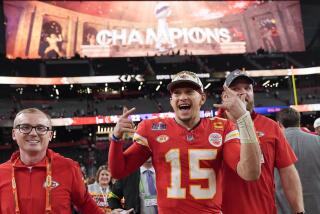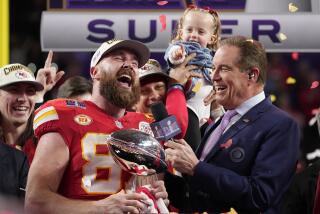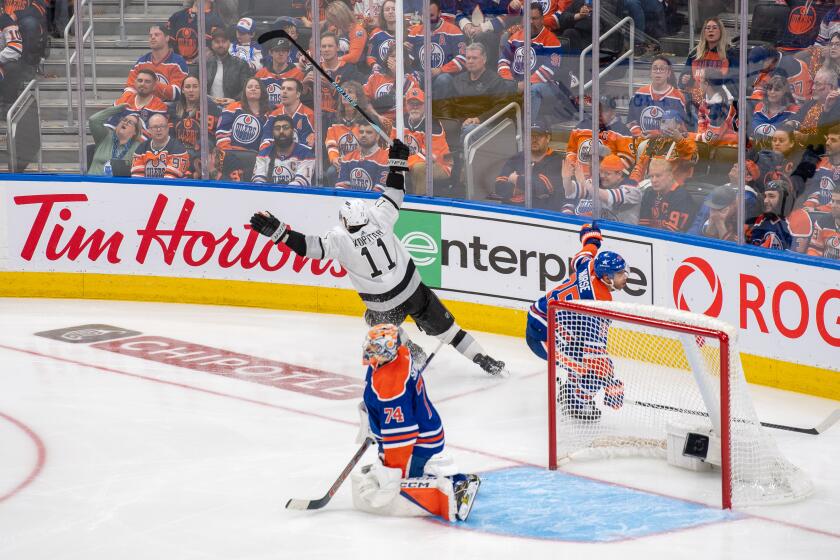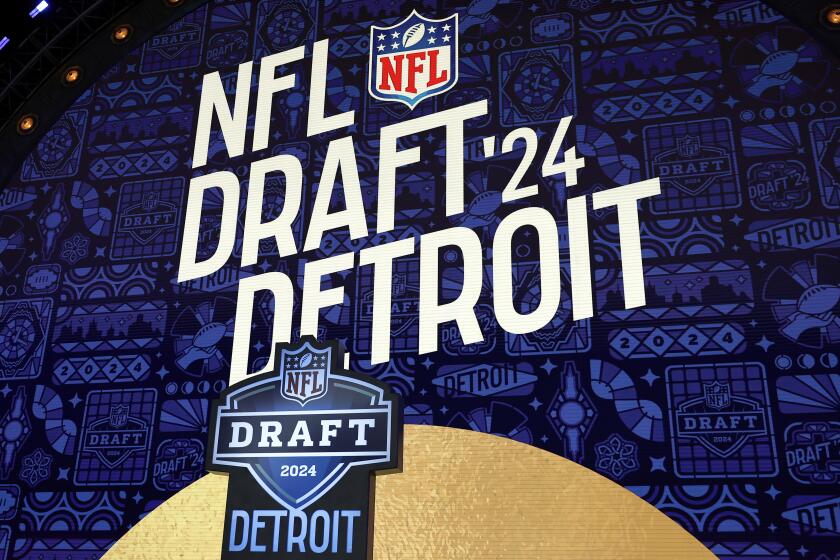Why Patriots Won
HOUSTON — This was one of those days when it paid to have last possession. And it was the New England Patriots who, until there were but four ticks left on the clock, had it.
On the decisive last-minute drive into the wind here Sunday, New England quarterback Tom Brady, smoothly executing Coach Bill Belichick’s game plan, completed just enough passes to position Adam Vinatieri for the winning 41-yard field goal.
In the 38th Super Bowl, the Patriots won, 32-29, after Carolina quarterback Jake Delhomme had made it 29-29 with his last touchdown pass.
Delhomme, in fact, was the man who made it a game.
After the Panthers’ conservative coach, John Fox, finally gave him the green light to throw downfield, the Carolina quarterback had one of the great long-passing performances in the history of NFL championship football. And all he needed was one more series.
With last possession — the last shot — Delhomme wins. It was on Carolina’s first several possessions in the first half that Fox denied him that chance, waiting too long to open up even though New England, driving twice, blew two early field goals. Unhappily for the Panthers, Fox let the Patriots score the first touchdown.
Pats’ Structured Pass Offense the Difference
DELHOMME’S IMMATURITY had given New England the opportunity to break open the strangest of all Super Bowl games — a game that was still 0-0 with fewer than four minutes remaining in the first half — when he tried too hard and too long to make a play. It ended with the sack that opened the door for Brady’s opening touchdown.
Delhomme, however, rebounded immediately with the first big pass of the game, one that Steve Smith caught on a 39-yard touchdown play.
And in the fourth quarter, Delhomme did it again, firing to Muhsin Muhammad on an 85-yard touchdown play.
But the Panthers aren’t accustomed to playing passball. The Patriots are. And it was with their more structured pass offense — one they’ve practiced through two training camps and two regular seasons — that the Patriots held on to win.
They won doing what they do all the time, throwing, catching, and scoring. The Panthers stayed in the game by connecting on a few long passes.
And in the end, the Patriots succeeded because, for months, they’ve been practicing and sharpening their passing game — while the Panthers were practicing and sharpening their running game — and because the Panther front four, a gilded bunch, wore themselves out chasing Brady.
Sandlot Passing Almost Puts Panthers In
THE PANTHERS were the better team with the better players. They were missing only the better game plan, one focusing on Delhomme’s passing.
And next season they can be the league’s dominant team by making two changes:
Carolina coach Fox will have to commit to pass offense. No pro club can run its way to the championship these days even if it has two running backs as good as DeShaun Foster, who sped 33 yards to score on the game’s best rushing play, and Stephen Davis. It was only when Fox realized he’d have to let Delhomme throw that he made it a game.
The Panthers will have to teach Delhomme how to throw. His accuracy is unquestioned on long passes — but no pro club has ever won titles on a longball diet. To make Carolina a consistent contender, Delhomme needs a passing coach to teach him to throw midrange passes like Brady does it.
Delhomme’s passing style — the steps he needs to power the ball —has been outdated by Brady’s style, which originated with Super Bowl III champion Joe Namath.
As New England’s slow-motion films show, Brady’s is a quick circular motion ending in a quick throw that nullifies the defensive rush.
Brady lets go of the ball so fast that he’s hard to sack, by comparison with Delhomme, who was sacked repeatedly Sunday.
Delhomme nearly won this game with what was closer to a sandlot pass offense than the sounder, more organized pass offense the Panthers need. The sandlot stuff worked for Delhomme only because of his longball accuracy.
When rushed on midrange passes, unable to step into the throw, he often flung the ball sidearm, flinging it erratically. All too often, his passes went wild. If he’d won, Delhomme might not have seen the need to change styles. This loss could help him.
Patriots Win with a Passing Machine: Brady
FOR THE SECOND time in three winters, New England won, Belichick won, Brady won, by sticking with the passing game the Patriots have so obviously planned and rehearsed for more than 24 months — since the day they beat the St Louis Rams in the 26th Super Bowl but immediately embraced the Rams’ pass-first philosophy.
Though labeled a defensive team, what the Patriots clearly are is something else. They’re a passing team. They’re the latest in a long line of winning Super Bowl passing teams going back more than 20 years to the five-time champion San Francisco 49ers with Joe Montana and Steve Young and also including, among others, the Rams with Kurt Warner, the Denver Broncos with John Elway, and the Green Bay Packers with Brett Favre.
For example, the Patriots easily made their two-point conversion attempt — which they were forced into as a penalty for Vinatieri’s two first-half field-goal failures — with a direct snap to a running back on a fake-pass run that had been long practiced along with, of course, some special two-point pass plays.
When the Panthers’ turn came, they flubbed Delhomme’s pair of two-point tries. He missed the target on both throws by much too much. Neither had the look of a practiced play.
By contrast, Brady, after two years of constant passing, is by now almost a machine. Although he threw an interception that hurt for a while, interceptions are part of what happens to passing teams. This time he was throwing to an open receiver but misread an unusual Panther zone defense he hadn’t expected.
The important point about Brady’s passing is that he throws hardly any interceptions.
The difference between him and Delhomme is that Brady can complete pass after pass at all ranges going down the field — the way you have to do it to win championships — while Delhomme, to complete a meaningful pass, must launch it out there long range. At any range, Brady finds the open target. And he wins.
Bob Oates, a longtime staff writer for The Times, has covered every Super Bowl.
More to Read
Get our high school sports newsletter
Prep Rally is devoted to the SoCal high school sports experience, bringing you scores, stories and a behind-the-scenes look at what makes prep sports so popular.
You may occasionally receive promotional content from the Los Angeles Times.






